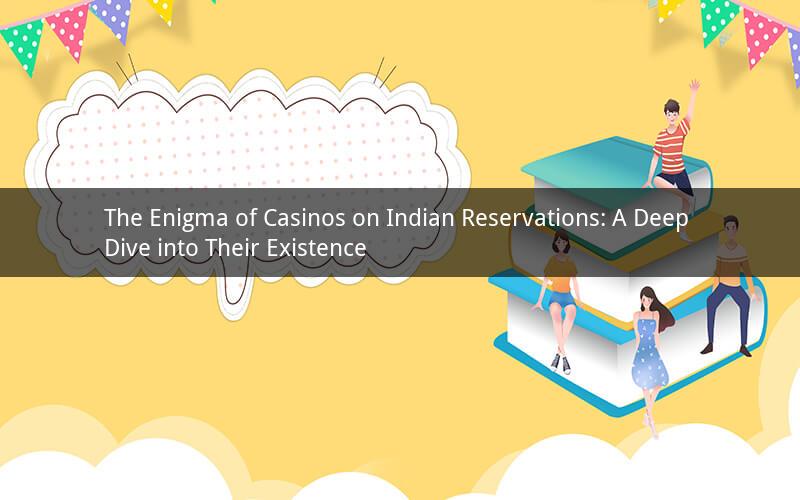
Casinos on Indian reservations have long been a topic of intrigue and debate. Situated on land belonging to Native American tribes, these gaming establishments have become a significant source of revenue and cultural significance. But why are there casinos on Indian reservations? This article explores the historical, economic, and social factors that have contributed to their presence.
I. Historical Context
The establishment of casinos on Indian reservations is rooted in a complex history of land claims, federal policies, and the struggle for sovereignty. The concept of Indian reservations can be traced back to the Treaty of Fort Laramie in 1868, which designated vast territories as reservation land for Native American tribes. However, the federal government's policies towards Native American tribes have often been controversial, resulting in a long history of land disputes and treaty violations.
In the 20th century, the Indian Gaming Regulatory Act (IGRA) of 1988 was enacted, allowing tribes to conduct gaming activities on their reservations. This legislation was a response to the growing economic challenges faced by many tribes, who were struggling to survive on their reservation lands. The act provided a legal framework for tribes to operate casinos, which, in turn, has led to significant economic development and self-sufficiency.
II. Economic Benefits
One of the primary reasons for the presence of casinos on Indian reservations is their economic benefits. For many tribes, gaming has become a lifeline, generating substantial revenue that is used to fund various programs and services. This includes infrastructure development, education, healthcare, and social services. Additionally, casinos have created jobs and stimulated local economies, leading to improved living standards for many reservation residents.
The economic impact of casinos extends beyond the reservation boundaries. Casino tourism has become a significant driver of economic growth in surrounding communities, attracting visitors from across the country. This has resulted in increased business activity, tax revenue, and job creation in areas that may have previously been economically depressed.
III. Cultural Significance
Casinos on Indian reservations also hold significant cultural importance. For many tribes, gaming is deeply intertwined with their heritage and traditions. The incorporation of cultural elements into casino design, games, and promotions helps to preserve and promote Native American culture. In some cases, proceeds from casino operations are used to support cultural preservation initiatives, such as language revitalization programs and the construction of cultural centers.
IV. Challenges and Controversies
Despite the economic and cultural benefits, the presence of casinos on Indian reservations is not without its challenges and controversies. One of the main concerns is the potential for addiction and its impact on tribal members. Many tribes have implemented programs to address gambling addiction and provide support to those affected.
Additionally, there have been criticisms regarding the potential for corruption and the influence of casinos on tribal governance. Some argue that the revenue generated from casinos can be a source of power struggles within tribes, leading to political instability and division.
V. Future Outlook
The future of casinos on Indian reservations appears to be a mix of continued economic growth and the need for addressing the challenges that come with this growth. As tribes continue to develop and expand their gaming operations, they must also strive to maintain a balance between economic development and the preservation of their culture and traditions.
Q1: How have casinos on Indian reservations contributed to the economic development of Native American tribes?
A1: Casinos on Indian reservations have provided a significant source of revenue for tribes, which has been used to fund various programs and services, including infrastructure development, education, healthcare, and social services.
Q2: What is the cultural significance of casinos on Indian reservations?
A2: Casinos on Indian reservations hold significant cultural importance, as gaming is deeply intertwined with many tribes' heritage and traditions. Proceeds from casino operations are often used to support cultural preservation initiatives.
Q3: What challenges and controversies are associated with the presence of casinos on Indian reservations?
A3: Challenges and controversies include the potential for addiction, political instability, and corruption within tribes. Additionally, there are concerns regarding the impact of casinos on surrounding communities.
Q4: How have casinos on Indian reservations influenced local economies?
A4: Casinos have attracted visitors from across the country, stimulating local economies and creating jobs in areas that may have previously been economically depressed.
Q5: What is the future outlook for casinos on Indian reservations?
A5: The future of casinos on Indian reservations appears to be a mix of continued economic growth and the need for addressing challenges such as addiction, corruption, and political instability, while maintaining a balance between economic development and cultural preservation.